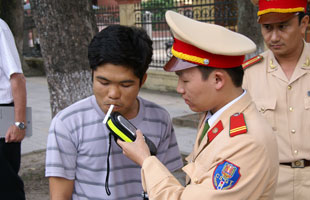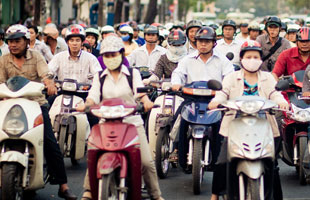
The lunar new year (Tet) is a time of joy and celebration, but as with any holiday period that involves eating, drinking, and travelling, the risk of exposure to avian influenza, food poisoning, and road traffic injuries is heightened in Viet Nam.
The World Health Organization (WHO) office in Viet Nam outlines simple precautionary measures to ensure that the Year of the Snake begins with good health, joyous and safe festivities.
"Tet is a time of happiness and a celebration of life. It should not be a time of illness or mourning the loss of loved ones. I urge all people to take the following simple precautions to protect themselves and their family this holiday season,” said Dr. Takeshi Kasai, WHO Representative in Viet Nam.
Avian Influenza
Since December 2003, when the H5N1 virus was first detected, Viet Nam has reported the third highest number of human infections (after Indonesia and Egypt) with 123 confirmed cases including 61 deaths (50% fatality). With the surge in the movement, sale and slaughter of poultry during the Tet holiday, there is a corresponding increase in the risk of avian influenza. The main risk factor for human infection appears to be direct or indirect exposure to infected live or dead poultry or contaminated environments. The slaughter, defeathering, handling carcasses of infected poultry, and preparing poultry for consumption, especially in household settings, are likely risk factors.
Following these precautionary measures can help protect yourself, your family and your community from this very serious illness:
- Avoid contact with poultry that are sick or found dead
- Report sick or dead poultry immediately to the authorities
- Slaughter all poultry safely
- Clean cutting boards and other utensils with soap and hot water to keep raw poultry from contaminating other foods
- Cook poultry and poultry products thoroughly (do not eat pink meat, runny eggs or raw duck blood)
- Wash hands with soap and water before and after handling live poultry
Food Safety
Food poisoning is a critical health issue in Viet Nam, causing severe illness and even death. In 2012 there were more than 120 reported incidents of food poisoning that caused nearly 5000 illnesses and 20 deaths. Many cases of severe food poisoning occur at family feasts or mass celebrations. This usually happens because of a lack of hygiene and sanitation when handling and preparing food.
These simple practices help to reduce the risk of food poisoning:
- Always wash hands after going to the toilet and before and after preparing food
- When preparing meals keep raw and cooked food separate
- Cook food thoroughly
- Keep food at safe temperatures
- Use only safe water and raw materials

Meanwhile, motorcycle helmet laws introduced in 2007 increased helmet wearing in motorcycle drivers and passengers from 40% to more than 90% within 6 months. Within a year of introducing the laws, more than 1 500 lives had been saved and 2 400 injuries prevented.
WHO support
Remembrance for Road Traffic Victims
Over the past five years, WHO has provided technical and financial assistance to improving road safety in Viet Nam, through the Bloomberg Philanthropies funded Road Safety in 10 Countries (RS10) Project. The Organization is currently working with central and provincial government counterparts and international partners (Global Road Safety Partnership and Johns Hopkins University) to improve law enforcement to prevent drinking and driving.
In 2010 and 2011, road traffic mortality rates decreased by 25% and 20% respectively in provinces following the programme. Meanwhile, in a province that did not introduce the programme, road traffic deaths increased by 26%.

November 18 is the World Day of Remembrance for Road Traffic Victims. In November 2012, Viet Nam organized a month-long road safety campaign, combining home visits to families who have lost loved ones, a traditional Buddhist spiritual healing ceremony and mass media campaigns.
“Reflecting on what has been lost helps people recognize the severe consequences of road traffic crashes. We hope this will bring about changes in road users’ attitudes, behaviour and responsibility,” says Mr Nguyen Hoang Hiep, the Vice Chairman of the National Traffic Safety Committee and primary organizer of the national campaign.
“Few causes of ill-health confronting nations today are as imminently preventable as road traffic injuries,” says Dr Takeshi Kasai, WHO Representative to Viet Nam. “We commend the Vietnamese Government and its road safety agencies for prioritizing many of the measures needed to tackle this problem head on.”
